New Year's in Hong Kong! Click here!
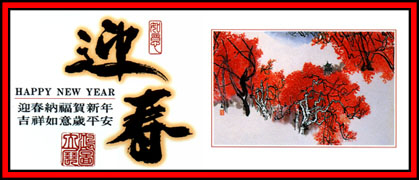
| 1 January 1999 New Year's in Hong Kong! Click here!
 |
| 23 December 1999 Things are getting better. Today it was 54.7°F in my room when I awoke, but the sun was out all day and the winds have died down so it wasn't too bad. I couldn't convince my Chicago friend of that, though. He arrived from Japan last night and left all his heavy winter clothes there because the last time he visited HK in December, it was rather warm. I lent him a hat and an extra jacket to see him through to Monday. The humidity is extremely low right now, about 30-40% which is really unusual for HK where the humidity normally runs about 80-90%. It is so dry that yesterday huge pieces of paint started popping off one of the painted exterior walls of the school where I live. And my laminated desk top popped off its base and started curling up. Yesterday turned out to be the coldest winter solstice in HK's recorded history. The official temperature was 41°F at the observatory in Kowloon. In the more open New Territories, they had frost, and on the high mountain peaks they had real ice, something almost never seen here. Many people may complain about the cold weather but secretly enjoy it because it gives them a chance to wear their winter coats and boots and scarves and gloves which sometimes lay unused for years! |
22 December 1999 The coldest weather in the last eight years is upon us now. It got down to 6.2°C this morning (that's 42°F) and only got up to 54°F this afternoon. We were lucky that it was a nice sunny day to warm things up. Those temperatures may not seem cold to people from North America, but remember there is no heat in the buildings here. When I woke up this morning, the temperature in my room was 53°F. Luckily there is hot water in the shower (but not any place else in the house so every time you wash your hands, it's with water at outside temperature.) During the day I can put on more clothes and it's not so bad when I'm outside and moving around, but when I'm in my room working at the computer is when I feel the cold. I wear gloves with no fingers for typing and warm my hands up around a light bulb every once in a while. Another problem here is the intense winds we have been having from the north the past three or four days, what the British call "a strong winter monsoon." The houses here are not airtight. They're made to let air in, not keep it out. I have all my windows closed as tight as they'll go but the curtains still flutter, and last night when I was in bed and the wind was blasting away, my door suddenly blew open from the air moving through the room! The weather bureau says the cold will be with us for another week or so. The coldest weather in the last eight years is upon us now. It got down to 6.2°C this morning (that's 42°F) and only got up to 54°F this afternoon. We were lucky that it was a nice sunny day to warm things up. Those temperatures may not seem cold to people from North America, but remember there is no heat in the buildings here. When I woke up this morning, the temperature in my room was 53°F. Luckily there is hot water in the shower (but not any place else in the house so every time you wash your hands, it's with water at outside temperature.) During the day I can put on more clothes and it's not so bad when I'm outside and moving around, but when I'm in my room working at the computer is when I feel the cold. I wear gloves with no fingers for typing and warm my hands up around a light bulb every once in a while. Another problem here is the intense winds we have been having from the north the past three or four days, what the British call "a strong winter monsoon." The houses here are not airtight. They're made to let air in, not keep it out. I have all my windows closed as tight as they'll go but the curtains still flutter, and last night when I was in bed and the wind was blasting away, my door suddenly blew open from the air moving through the room! The weather bureau says the cold will be with us for another week or so.
|
15 December 1999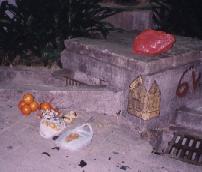 A few days ago I was coming home from our RCIA class about 9:00 PM and a woman was lighting joss sticks (incense) and setting out these offerings at the edge of a concrete drain near the Lok Fu Recreation Ground, a football field. I don't know what the occasion was that prompted her to put out the oranges and incense and pieces of chicken. There are many times throughout the year when such offerings must be made to appease the spirits of deceased ancestors or to satisfy some deity. And I don't know why the woman picked a concrete drain as the place to make the offerings. On any given day I can find offerings in what I would consider the most unlikely spots, but for the person making the offerings, it is a sacred spot or has some special spiritual meaning. A few days ago I was coming home from our RCIA class about 9:00 PM and a woman was lighting joss sticks (incense) and setting out these offerings at the edge of a concrete drain near the Lok Fu Recreation Ground, a football field. I don't know what the occasion was that prompted her to put out the oranges and incense and pieces of chicken. There are many times throughout the year when such offerings must be made to appease the spirits of deceased ancestors or to satisfy some deity. And I don't know why the woman picked a concrete drain as the place to make the offerings. On any given day I can find offerings in what I would consider the most unlikely spots, but for the person making the offerings, it is a sacred spot or has some special spiritual meaning.
|
10 December 1999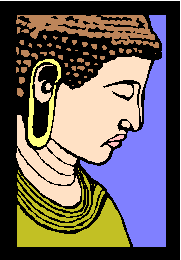 When asked if they believe in any sort of religion, an average of only 13% of the people around the world responded that they do not believe. But in Hong Kong that figure jumps to 56% who do not believe. Only 23% of HK people indicated they regard God as of high importance compared with 63% of the rest of the world's populations. Some HK commentators find it hard to believe that 64% of people here do not believe in some form of God, and I would share that doubt given the ubiquitous signs of spirituality in HK daily life. Perhaps the way the questions were asked could account for the high number expressing no belief. Asking a HK Chinese person what religion he belongs to often draws a blank because they don't think of themselves as "belonging" to a group. Instead they are just doing those practices, which others describe as religious, which are a traditional part of Chinese culture. When asked if they believe in any sort of religion, an average of only 13% of the people around the world responded that they do not believe. But in Hong Kong that figure jumps to 56% who do not believe. Only 23% of HK people indicated they regard God as of high importance compared with 63% of the rest of the world's populations. Some HK commentators find it hard to believe that 64% of people here do not believe in some form of God, and I would share that doubt given the ubiquitous signs of spirituality in HK daily life. Perhaps the way the questions were asked could account for the high number expressing no belief. Asking a HK Chinese person what religion he belongs to often draws a blank because they don't think of themselves as "belonging" to a group. Instead they are just doing those practices, which others describe as religious, which are a traditional part of Chinese culture.
|
| 26 November 1999 Hong Kong people are probably, in general, no more impolite or lacking in courtesy than most other national groups, but that is not to say there aren't cultural manifestations that appear extremely rude to outsiders. Today I was waiting at one of HK's many uncontrolled intersections in the downtown area where pedestrians must literally force their way across a street--risking life and limb--because there is no provision for stopping traffic for them. Then I had to cross in front of a car inching out across the sidewalk into the street from a construction site. Cars reign supreme here, and from the driver's perspective I had darn well better not be in front of his car when he decides the approaching gap in traffic long enough to allow him to squeeze in. That reminded me of the three or four times in the US recently, when, riding a bike along a sidewalk, I was approaching a car inching across the sidewalk to enter the street traffic. Every one of those cars reversed and pulled back off the sidewalk when its driver saw me coming! A HK driver, observing such a scenario, wouldn't even understand what the US drivers were doing. |
| 24 November 1999 Yesterday the Christmas lights were officially turned on here in Hong Kong. They don't celebrate Thanksgiving here so that artificial opening day for the Christmas season doesn't apply to planning here, and probably HK merchants appreciate the opportunity to open the Christmas season, the Christmas shopping season, a day or two ahead of their rivals. HK is still feeling the effects of the Asian slowdown so the displays this year are said to be simpler--and so less costly--than in the past, and many of them have been made more general so that they can also serve for the January 1st New Year and for the Chinese New Year in February without a great deal of modification. |
| 19 November 1999 The new Hong Kong coins that were issued to replace those with the Queen's head on them are really ugly. They look like supermarket tokens or tokens for children's rides at a carnival. Now the chief of the Hong Kong Monetary Authority admits he designed them and did a poor job of it. To quote him from the HKMA web site: "The dull and unattractive coins of Hong Kong hardly befit Hong Kong's status as an international financial centre. If readers examine the design of our coins, they will find it, at best, unattractive and unremarkable. Those with any artistic sense might even think it repulsive. "Yes, the coins were designed by me and I am sorry that users have to put up with them every day." |
| 14 November 1999 I occasionally read the South China Morning Post, HK's major English newspaper, on the Internet, and a few days ago it had an article about a HK doctor who is being investigated for making cell phone calls while doing microscopic surgery on a man's knee. The patient was under a local anesthetic and clearly heard the doctor talking about his preference for a silver BMW instead of another $100,000 car he had been considering. The medical society has strict guidelines against the use of cell phones in operating rooms but apparently HK's obsession with the telephone was too much for this doctor who is being sued by the patient as well as scrutinized by the medical profession. |
| 16 September 1999 Typhoon York While most of the world's attention was focused on Hurricane Floyd, a truly humongous storm, Typhoon York made a direct hit on Hong Kong today. The #1 warning signal had been up for days, went to #3 yesterday, then to #8 at 0330 this morning, and then to #10 (maximum) at 0630 and stayed there for 12 hours. This was the strongest typhoon I've experienced here although the winds didn't get much above 120 km/h. It woke me up this morning with the wind howling and tree limbs breaking off, and because there are a lot of trees right outside my window, I decided to get up early rather than take a chance on one of them coming through the window on me. Everything was closed today and nothing was moving outdoors for a change since the storm hit early enough that no one was already at work. I used the day for getting some correspondence written and fixing a computer problem. Tomorrow I need to go up on the roof and check our television antenna. While ago during the evening news, it was obvious something is wrong, but it's too dark and too wet to go out now. 12 inches of rain has fallen in the last 18 hours and is still coming down. One person was killed today, one is missing, and 450 have been injured. |
| 27 August 1999 Yesterday morning I noticed a strong odor in the dining room and quickly traced it to the toaster. Actually that was my first place to check because the same toaster had a horrible smell last year, too. That time I suspected it was a gecko (a small lizard) that had died inside the toaster but I was not able to locate it because the toaster is assembled with some special screws that need a non-standard tool to remove them and I couldn't open it. I just didn't use the toaster for six months and kept running it through the toasting cycle--without bread--hoping that the heat would desiccate the dead body and eventually kill all the germs. This time I thought I saw a piece of tail sticking out one of the vent holes in the bottom so I kept working and banging on the toaster and eventually a three-inch gecko plopped out, definitely dead and definitely the source of the smell. He either got electrocuted or crushed by the pop-up mechanism. There weren't any signs of burning, though. The smell still lingers a bit so I'll keep running the toaster through its cycles for a few days till I hope any gecko residue has been sterilized. |
24 August 1999 -- Festival of the Hungry Ghosts 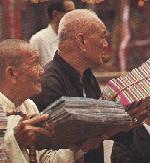 This festival on the fifteenth day of the seventh moon is to placate the dispossessed ghosts of the world. Not having any relatives or place to go, they can become very angry, and so when the underworld is opened up on this day, people burn offerings to please them. Here a couple of elderly men bring stacks of paper clothes to be burned for the ghosts. All over Hong Kong tonight people are burning paper images of clothes, money, and other possessions in special containers placed by the government in parks and playgrounds. Even more people are burning the images on street corners and in the stairwells and balconies of their high-rises. This festival on the fifteenth day of the seventh moon is to placate the dispossessed ghosts of the world. Not having any relatives or place to go, they can become very angry, and so when the underworld is opened up on this day, people burn offerings to please them. Here a couple of elderly men bring stacks of paper clothes to be burned for the ghosts. All over Hong Kong tonight people are burning paper images of clothes, money, and other possessions in special containers placed by the government in parks and playgrounds. Even more people are burning the images on street corners and in the stairwells and balconies of their high-rises. |
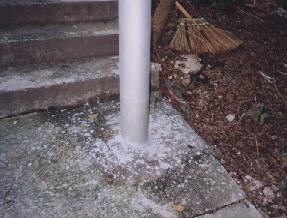 23 August 1999 23 August 1999A friend of mine once commented that when a Chinese couple moved out of an apartment they rented from him in the US, the floor was covered with drops and smears of paint. That didn't surprise me at all. While most Americans very carefully spread dropcloths over the floor or even the ground outside before applying paint to wall or fence or furniture, that is almost unheard of here. So paint splashes or drips on the floor--why worry about that? Floors are supposed to be dirty. If your child was shooting a watergun full of colored water in your yard and some fell on the grass, you wouldn't worry. Why worry about some paint on the floor--or sidewalk? When the Bishop Ford Center was repainted inside, I watched while the workmen repainted black living room furniture on the living room rug, with no dropcloth. Here is a photo of a recently painted lamppost near our center, with much paint on the sidewalk--on top of the paint from the previous paint job. |
| 16 August 1999 More on the Supermarkets... Wellcome and ParknShop have continued their head-to-head competition for a week now. In yesterday's newspaper, an article listed the top ten articles sold last week by these two chains and by AdMart, the upstart competitor that sparked the price war. Coca-Cola was the #1 seller for two stores and #2 for the third but that was to be expected because it was the loss leader most heavily advertised. Surprising to me--but it shouldn't have been, now that I think of it--was the fact that toilet paper ranked #6, #4, and #1 for the three store chains. Toilet paper is a huge part of daily life here with rolls everywhere--except in toilets. People use it in place of Kleenex, paper towels, and napkins, to name just the most common uses. But it's never in public toilets because people take it for all the other uses! |
| 15 August 1999 I pulled a real faux pas this weekend. In our weekly fax bulletin, I noted that this week was the first death anniversary of parents of two of our members and asked for prayers for them and their families. Unfortunately I mentioned that the mother of one woman died instead of her father. No big deal, you say? It is here where superstition and fung shui rule daily life and even government. To mention something like in connection with someone is tantamount to making it happen. Even if the Catholic woman (a recent convert from traditional Chinese religion) doesn't fault me, her mother certainly might. I apologized profusely but if the mother should unexpectedly die this year, I could get the blame! |
| 10 August 1999 The two major supermarket chains in Hong Kong are both owned by the same parent company and have operated as something of a duopoly. An upstart company AdMart is trying to challenge them by offering Internet ordering and home delivery so one of the big two, ParknShop, has responded with a cut-price promotion on 1000 items. It hasn't had the full effect desired, though, for typical HK reasons. One housewife said: "I won't be buying too much just because of the sale. What's the point? My house is too small to store much." Another shopper said he would not be buying extra goods because "carrying all the bargain products home would be too much of a problem." (Remember, people in HK don't have cars.) |
| 18 July 1999 This morning I was walking along a small-town road going over to the Maryknoll seminary building in New York. All the houses have driveways leading out to the streets, and as I started to walk past one house, a man came out of the house, got into the car and started it, and prepared to back out the driveway. I was getting ready to cross his driveway at the street end and was watching him so I wouldn't get run over, but although he had put the car in reverse (the backup lights were on), he didn't move an inch until I had completely passed his drive. That would never happen in Hong Kong! No HK driver would ever wait for a pedestrian. Cars have legal right-of-way at intersections, and they take it everywhere else, too, even if they're driving across a sidewalk or some area where you would assume pedestrians are in the right because it's their place to walk. HK drivers assume that if they're driving, no matter where it is, they have right-of-way. |
| 14 July 1999 On Monday, approximately 6,000 mainland Chinese people lined up in a long queue outside the Legal Aid department downtown. They have entered Hong Kong illegally in a bid to be reunited with their parents who are HK residents, but the National People's Congress of the mainland thwarted that by "reinterpreting" the HK supreme court's ruling that they could stay. So now they were lined up outside the legal aid centre to confirm that they were part of the court challenge to China's challenge to the HK court ruling. But because it was Monday, quite a few people, seeing the queue snaking along the streets, thought it was for the new Hello Kitty doll set that McDonald's releases every Monday morning! They jumped into the line and patiently inched forward until they were informed the purpose of the line and, embarrassed, made a quick exit! |
| 8 July 1999 To illustrate the high cost of living in Hong Kong, the indomitable Chinese commercial spirit, and the reality of the property market: a Hong Kong entrepreneur bought a "shop" for US$206,000 from a property developer. The "shop" was a recess in an exterior wall of a shopping centre and measured 31 feet 9 inches long and 1 foot 3 inches wide--basically just the space between two vertical columns on the outside wall. The floor area was calculated at 57 square feet. But the shop owner found that he could only use 7 inches of the 15-inch width because of zoning regulations. He's now fighting to be reimbursed for the unusable part of his "store." |
| 6 July 1999 The Economist magazine has just released the results of its periodic survey on the costliest cities to live in throughout the world. Hong Kong now ranks third, behind the Japanese cities of Tokyo and Osaka. Property prices are the main factor in the high cost of living here. |
| 2 July 1999 Even with the economic downturn, a recent survey shows that 7 out of every 10 Hong Kong adults have a mobile phone. While consumer spending generally has decreased, phone sales have increased because there are now six Hong Kong mobile phone networks frantically competing with each other. Prices here are 25% lower than in Japan and Taiwan, and the service is better quality. The biggest sales jump has been among students and people starting their first jobs as the prices have fallen into their affordability bracket. 65% of women here have mobile phones, the highest rate in Asia. |
| 30 June 1999 One new skyscraper recently completed in Hong Kong has 62 floors, according to the architect's plans. But if you enter the elevator to go to the top floor, you have to press "70". Why? Well, in Cantonese, the word "four" is pronounced "sei" and the word for "death" is also pronounced "sei." So all floors with 4s (4, 14, 24, 34, 44, 54, 64, 74) were eliminated to cater to the superstitious who would not want to work or do business on a floor associated with death. And the 13th floor was also omitted to cater to western superstitions. |
18 June 1999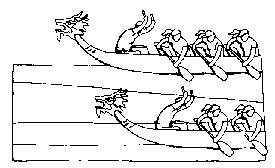 Today is the Dragonboat Festival or Tuen Ng in Cantonese. It is based on the legend of Qu Yuan, a respected and honest official in the Chu dynasty. When accused of corruption by jealous rivals, he threw himself into the Mi Lo River and drowned. Local fishermen furiously paddled out to save him but were in vain. Part of their efforts included throwing bundles of rice into the water to keep the fish from eating the body. Today is the Dragonboat Festival or Tuen Ng in Cantonese. It is based on the legend of Qu Yuan, a respected and honest official in the Chu dynasty. When accused of corruption by jealous rivals, he threw himself into the Mi Lo River and drowned. Local fishermen furiously paddled out to save him but were in vain. Part of their efforts included throwing bundles of rice into the water to keep the fish from eating the body.
Today the racing boats symbolize the fishermen's attempts to save Qu Yuan, and specially prepared bundles of sticky rice, wrapped in banana leaves, are shared and enjoyed by local families. Locally the major racing venue is at Stanley on Hong Kong Island. I heard on the BBC this morning that HK gay and lesbian groups have declared this "Gay Day" in Hong Kong because they say there is evidence that Qu Yuan had a special love for the Chu emperor of his time. |
| 15 June 1999 Friday is the Dragon Boat Festival in Hong Kong, the Tuen Ng public holiday. The day is marked by races between these special boats at several venues around Hong Kong. Today the boats are ceremoniously assembled, with carved heads and tails made of camphor wood attached to the long narrow bodies. The boats are crewed by 20 rowers, a drummer to keep time for the rowers, and a steersman.
|
| 7 June 1999 About 3:00 AM the winds were blowing strongly enough to wake me so I turned on the radio and found that the #9 typhoon signal had been raised. This is the second highest signal in a scale from 1 to 10. The winds never got much stronger than 75 MPH, though, so the #9 signal (changed to a #8 after a few hours) was due mainly to the fact that Typhoon Maggie scored a direct hit on Hong Kong. The #8 was replaced by the #3 signal at 10:30 this morning, and at that point businesses started reopening and people went on to work. Now Maggie is only a tropical depression far west of us and leaving us only wide a band of rainstorms that will continue for a couple days. |
6 June 1999Typhoon signal #3 is up!Typhoon Maggie is 350 kms east of us and heading west at 30 kms per hour. Will we get anything? Tune in tomorrow! (Right now it's a bit cloudy and just hot and humid, with very little wind.) |
| 4 June 1999 Asia is noted for its flying cockroaches, big ugly brown things, about 1 3/4 to 2 inches long, and as fast and maneuverable on the ground as ordinary roaches but with the addition of rather clumsy flight. In India I used to sleep under a mosquito net sometimes as much for protection against the flying roaches as against the mosquitoes. Here in Hong Kong I usually see ten or so of them a year in our house. Last night about 10:00 PM, I went out of my room to get some tea and noticed a big one on the dining room floor so I went back to get a shoe to whack it. When I returned there were two more and then another and then another. Then I whacked five more in the bathroom where they seem to be coming in the window. All together I killed eighteen of them in about twenty minutes and a few more got away. Then this morning there were another eight of them dead or dying throughout the house. I've never seen roaches swarm like that and have no idea what was going on last night. Earlier this week the termites were swarming but they do that every year for a day or two. I'm waiting to see what happens tonight! |
| 23 May 1999 This weekend is the big Bun Festival on Cheung Chau Island. The trademark of the celebration are the tens of thousands of steamed buns which are mounted on dozens of bamboo towers, some up to 45 feet tall. The buns are offered to the spirits of the dead who can't reach heaven because they didn't receive a proper burial. In decades past, young men vied to climb the towers to snatch the highest--and most auspicious--bun, but after some towers collapsed and injured bystanders, the buns now are distributed by hand. The celebration had its origin back in 1783 when the villagers invoked Pak Tai, the god of the north, to save them from bubonic plague. Later the bun towers were added as were foot races and parades featuring small children mysteriously "floating" above the crowds on special, almost invisible rigging. Today it is a three-day festival that brings throngs of people to the island to enjoy a bit of HK's fascinating culture. |
22 May1999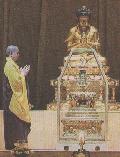 Today is Buddha's Birthday, officially celebrated for the first time in Hong Kong. Making this day an official holiday was one of the new government's first acts after the 1997 handover. To celebrate, a relic of the Buddha, one of his teeth, has been flown in from Beijing for the veneration of the faithful at the Coliseum here. It is interesting that the atheistic Communist government is providing a special plane and a security detachment to accompany this religious relic. Did they get religion? Or is this a chance to get back at the British for not allowing this holiday during their rule? Today is Buddha's Birthday, officially celebrated for the first time in Hong Kong. Making this day an official holiday was one of the new government's first acts after the 1997 handover. To celebrate, a relic of the Buddha, one of his teeth, has been flown in from Beijing for the veneration of the faithful at the Coliseum here. It is interesting that the atheistic Communist government is providing a special plane and a security detachment to accompany this religious relic. Did they get religion? Or is this a chance to get back at the British for not allowing this holiday during their rule?
|
| 5 May 1999 More on the "Chinese characteristics" of local culture: Today I went hiking in the rain out on one of the islands. While waiting to board the ferry, I saw a man sitting opposite me, drinking a canned beer with a straw and eating a large bag of M&Ms. Not an American combination, to be sure. Then this evening while I was at McDonald's for a #4 value meal, I noticed they have another new promotion. This time with a value meal you can get either a pineapple sundae (not the norm but then not too unusual) or--a curry potato pie. Now this is a dessert, remember! Last time it was red beans and corn! - - - - - - While I was out on the island, I walked past a lifeguard station at one of the beaches there. They had big signs up about sharks. It seems in HK all the shark attacks have been when the water temperature was 25° or higher so they advise everyone to be extra cautious when the temperature hits 24°. Today it was up to 23°. |
| 2 May 1999 Typhoon Leo turned out to be bomb after all, even though it had some last-minute suspense. It had been heading slowly north at only 6 MPH and was predicted to pass about 60 miles east of us, but then this morning it turned and headed straight for us. We had had the #3 typhoon signal up for two days, but the change of direction prompted the observatory to put up the #8 signal while we were eating lunch. That means that businesses close, the buses stop, and the ferry routes are closed down. People went out to buy food for supper before heading home. But just a few hours after I got home, the #8 was lowered and replaced by the #3 at 5:30 PM. Now (Sunday evening) there's hardly a whisper of wind and not even a drizzle. Bummer! |
| 30 April 1999 The reformers in China are always trying to justify the economic liberalization there by calling it "socialism with Chinese characteristics." They're trying to fend off the ultra-conservatives who see the economic developments of the last decade as turning away from true Marxism. Of course, they're right, but no one wants to admit that because a true Communist orthodoxy is the Communist Party's only claim to legitimacy. And, of course, they're never going to go back to true communism, either, because they don't want to give up the money they're making as closet capitalists. That's a long introduction--got a little bit out of hand--to another item which might be called "McDonald's with Chinese characteristics." I was walking by McD's a couple days ago and saw a big sign advertising their latest promotion--two new desserts, one hot and one cold. The hot dessert is a corn pie. The norm has been the traditional hot apple pie. Then here they added a pineapple pie. Now they've added corn. For westerners corn just doesn't figure as a dessert, but it sure does here, not only in these pies but in syrupy drinks and other concoctions. And closely related to it is the cold dessert now on offer--a red bean sundae. You order a sundae, what kind of topping do you ask for? Hot fudge, chocolate, strawberry? Well, here you can get red bean, another "dessert with Chinese characteristics." Here the red bean flavor is used in all kinds of sweets such as ice cream, slurpy-type drinks, etc. And now it's an ice cream topping at McDonald's! |
| 29 April 1999 Today the #1 typhoon signal was raised, and the radio just announced that the #3 signal may go up during the night as Typhoon Leo intensifies and comes closer to Hong Kong. The weather observatory even mentioned the possibility of going to a #8 signal but I doubt that will happen because the typhoon has been predicted to head toward the Chinese mainland south of us. Still it's exciting to hear them talk about raising higher signals for this, the first typhoon of the year. We missed all the good stuff last year because of El Nino which sent the usual typhoons coming our direction on a course to the north instead. |
| 13 April 1999 My mother got sick here in Hong Kong yesterday, and we decided she should see a doctor for a check up because she was due to fly out last night on a 31-hour flight back to the USA. I called the sisters who run a Catholic hospital near where we were staying, and they arranged for the resident to see her in the Out-Patient Department. An hour and a half later, she had had $225 worth of consultations, tests, and medication for an irregular heartbeat. It made me reflect how easy it is in most countries to get good medical care if you're white, have a credit card, and especially if you're American. Today's South China Morning Post had a feature about a reporter who went to a government clinic, a private doctor, and a private western-oriented clinic for a stomach ache. The government clinic here treated him for free after an hour and twenty-minute wait. The private Chinese doctor charged him $32 for the consultation and medicine with a seven-minute wait, and the private western doctor charged $65 for everything after a 20-minute wait. A pharmacist confirmed that the medications given by all three were basically the same. |
| 10 April 1999 Most of the US food chains have made it to Hong Kong. We have McDonald's, 7-11 (more than 400 of them!), Hardee's, Pizza Hut, and Jack-in-the-Box. And we have TCBY (The Country's Best Yogurt). That may not seem too unusual but today as I passed one of their outlets on a bus, I saw a sign advertising "green tea" yogurt! Bet you don't have that in the US! |
| 7 April 1999 Monday was the Ching Ming festival in Hong Kong, a day when local people go to the cemeteries to clean the graves of their ancestors and make offerings to placate the spirits. The weather was beautiful--too nice, in fact. Unusually, the humidity was less than 70% which contributed to the more than 200 hillfires ignited throughout the hilly areas where many ancient graves are located. Families bring offerings of roast pig, apples, oranges, wine, rice, etc.--and lots of incense. It is the burning joss, often left untended as the families leave, that is the cause of most of the wild fires that are an annual scourge. |
25 March 1999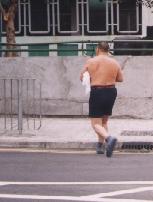 You can take the boy out of the country but you can't take the country out of the boy is a common expression in the United States, and it is probably even more true here in HK where the majority of the population were born in China or their parents were. Not that many years ago they were standing in the paddies planting rice. That history shows itself in many ways, and one of them is the tendency for many HK men to consider shirts as an accessory, not an essential garment. On the streets, in the subway, even in restaurants, it's common to see men without a shirt or with it slung over a shoulder. For the young guys who work the delivery trucks, there is a standard uniform: slip-on canvas shoes, gym shorts, a beeper, and a dragon tattoo all across their back--nothing else, no matter what the weather. You can take the boy out of the country but you can't take the country out of the boy is a common expression in the United States, and it is probably even more true here in HK where the majority of the population were born in China or their parents were. Not that many years ago they were standing in the paddies planting rice. That history shows itself in many ways, and one of them is the tendency for many HK men to consider shirts as an accessory, not an essential garment. On the streets, in the subway, even in restaurants, it's common to see men without a shirt or with it slung over a shoulder. For the young guys who work the delivery trucks, there is a standard uniform: slip-on canvas shoes, gym shorts, a beeper, and a dragon tattoo all across their back--nothing else, no matter what the weather.
|
| 19 March 1999 This winter has been the hottest on record according to the Hong Kong Observatory. The average temperature for the three-month period was 18.4°C (67.5°F), higher than usual because the upper airstreams failed to push colder air south in their normal patterns. The last two days have been especially warm--up to 75°F--and have caused all the concrete buildings, still "cold" from the winter, to sweat because they are all open to the humid outside air which condenses on floors and walls in actual puddles. Rainfall for the first two months of the year has also been exceptionally low, just 4.5mm instead of the usual 71.4mm. |
15 March 1999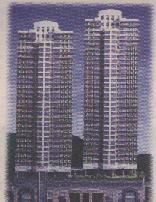 Just as bad or worse than Hong Kong's air pollution is its noise pollution which is immediately obvious to anyone arriving here. I am extremely lucky to be living at the top of a hill--still wooded because it is too steep to be developed--and removed from the street-level noises. Not so fortunate is the Caritas Magdalene School in Wanchai where I work with the deaf students. The Asian Wall Street Journal today quotes the principal, Sr. Theresa Chien: "We are at the end of our endurance levels," because of construction noise from two new luxury high-rise residential towers going up next to the school. Deaf students are especially affected by high noise levels because hearing aids can't discriminate between noise and meaningful sound, such as a voice, as does the brain of a person with normal hearing. For the deaf person all the noise is amplified and can even be painful. Just as bad or worse than Hong Kong's air pollution is its noise pollution which is immediately obvious to anyone arriving here. I am extremely lucky to be living at the top of a hill--still wooded because it is too steep to be developed--and removed from the street-level noises. Not so fortunate is the Caritas Magdalene School in Wanchai where I work with the deaf students. The Asian Wall Street Journal today quotes the principal, Sr. Theresa Chien: "We are at the end of our endurance levels," because of construction noise from two new luxury high-rise residential towers going up next to the school. Deaf students are especially affected by high noise levels because hearing aids can't discriminate between noise and meaningful sound, such as a voice, as does the brain of a person with normal hearing. For the deaf person all the noise is amplified and can even be painful.
|
12 March 1999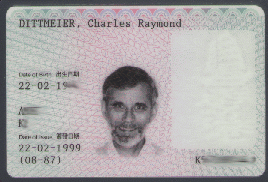 Today I finally received my new permanent residency Hong Kong identity card. After seven continuous years of living in HK, a person can apply for permanent residency. Getting the card doesn't have a lot of advantages except the right to vote. I could vote under British rule but lost the vote on 1 July 1997. Now I've regained it. Also the new card means that I can leave and enter HK without showing my passport. Today I finally received my new permanent residency Hong Kong identity card. After seven continuous years of living in HK, a person can apply for permanent residency. Getting the card doesn't have a lot of advantages except the right to vote. I could vote under British rule but lost the vote on 1 July 1997. Now I've regained it. Also the new card means that I can leave and enter HK without showing my passport.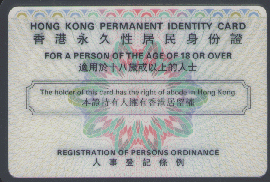
|
| 5 March The world's most crowded road network, according to an economics magazine survey, is in Hong Kong where there are 289 vehicles per kilometer of roadway. Taiwan, Singapore, Kuwait, and South Korea round out the top five most-crowded countries. By comparison, Britain has 63 automobiles per km. |
| 12 February 1999 Today I met with three other teachers from the deaf school over lunch to plan a retreat we will have in March. At the end of the set lunch in a typical restaurant, the others ordered hot tea and I ordered "ling cha" or iced tea. As is standard practice here, it's more like a soft drink because it has sugar added before serving, but I drank it. Then because it had three big slices of lemon in it--another HK custom--I poured the rest of my water glass over the lemons and ice and mashed the lemons with the spoon. I drank that. Then the waiter came and refilled my glass with water. But this time as I lifted it to my lips, I noticed a cockroach at the bottom of the glass, rather crudely dissected by all my lemon-mashing. Ughh.... One of the teachers tried to comfort me by saying that the Chinese medicine he takes has cockroach shells in it, but somehow that didn't make me feel any better. Hygiene is not one of the strong suites of HK. The government is sufficiently concerned about it to have initiated a broad program for improving food cleaniness and safety recently. It's needed, too. During our meeting after the meal, I watched the restaurant staff setting the tables for afternoon tea and they routinely fingered the eating parts of all the silverware they put on the tables. And it is common to see waiters deliver a handful of drink glasses with their fingers well submerged in the liquid contents. |
| 15 January 1999 The "cold" weather has finally hit Hong Kong. The temperature has been dipping to the mid-40°s in parts of HK the last few nights, getting up to the low 50°s during the day. Compared to the bitterly cold temperatures recorded around parts of the US the last couple weeks, HK's "plight" seems minimal. The problem here, though, is that no buildings have heat in them so the temperature inside the notoriously open structures--Chinese have a fixation on fresh air--is steadily dropping. I just checked the temperature in my room and it's 60°F at 10:00 PM. It's not so bad when you're moving around--sometimes it feels much warmer walking outside where it's actually cooler--but when you sit down at a computer for a long while, you start to feel it. I pity the school kids who sit all day long in open classrooms with intentionally strong breezes ruffling the papers on their desks. |
| 8 January 1999 Maybe it's because of the vile state of most public bathrooms in Hong Kong, but whenever new occupants take possession of a previously lived-in apartment here, they almost always tear out and replace completely the bathroom fixtures, even in these tough economic times. Maybe they picture the previous residents leaving this bathroom looking like the public toilets and just can't imagine sitting on the same toilet or standing in the same shower. At any rate, there is a booming business here in remodeling bathrooms. An average bathroom in HK is about 40 square feet, and replacing the toilet, shower, sink, and cabinet usually costs US$3500-$13,000. There's not much demand for extras like whirlpools and jacuzzis since there's little room for a tub, the equipment is expensive, and the next door neighbors pitch a fit every time the pump motors are switched on. |